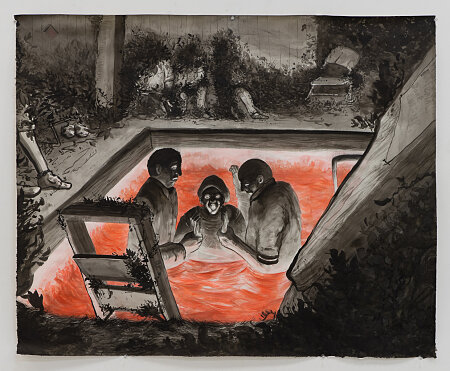
Before Paris
“But I don’t speak French,” he said.
“Psshhh,” she replied, waving aside her husband’s concern.
She straightened her hat, the wool cap that her friends claimed made her look like Catherine Deneuve, although he knew little about Catherine Deneuve beyond her demure and mysterious characters in two European films he’d seen. He had only recently become aware of the French New Wave—Truffaut, Resnais, Godard—through the films he had read about to prepare for their Paris vacation. He assumed that nothing much had changed in France since the early 1960s, and, after an evening of screening black-and-white cinema, had concluded that one Parisian hat looked much like another.
His wife motioned to him to keep up with the rest of the museum tour group—a dozen international visitors.
“C’est Paris, merci,” she whispered into his ear as he sidled next to her.
“You are bilingual,” he told her.
“Je parle beaucoup de langues,” she said, then offered “multilingual” as a word of clarification.
His wife had every right to tout her multilingual skills, since she spoke not only French and English but also Spanish, Italian, German—countries they had yet to visit. He, on the other hand, had dismissed the study of languages during his undergrad years in Omaha, only now relying on the trial version of an online app that taught every language from Turkish to Norwegian by flashing pictures of apples and horses and young women across the screen. From the afternoon they had touched down in Paris, he’d looked for opportunities to employ his limited vocabulary, but it seemed odd to stop a stranger in the street and ask for directions to the nearest apple or horse.
As they followed the other tourists into the next gallery, he was pleased to see that his luck had changed. Here, he was greeted by a collection of still lifes by Cézanne—apples in bowls, apples on plates, apples on tables, apples on cloths. He leaned toward his wife.
“Pommes,” he announced as he stroked his chin.
She stared at her husband blankly, but he said nothing more, as if a single word could convey the totality of Cézanne’s artistry. He returned to the apples—the colors, the shading, the shapes, barely apples he had to confess. They were somewhat round and somewhat russet, but they might just as easily have been plums or tomatoes. Perhaps they were tomatoes and his thoughts, through either free association or boredom, had wandered to Greece. Greece was where he had really wanted to vacation, not Paris. He had wanted to visit the Acropolis, Delphi, the Colossus of Rhodes. His wife’s reminder that no one had seen the Colossus of Rhodes since the third century did not lessen his enthusiasm for visiting a site he imagined as rooted, real, solid. He’d had his fill of vague impressions of fruit.
His wife also reminded him that he understood less Greek than he did French, but he dismissed her concern since he imagined that no one who wasn’t Greek would take the time to learn Greek. It made more sense to visit a country whose language he was never going to master than to fumble through a country where he knew just enough to make a fool of himself.
A tourist, draped in a black scarf and herringbone jacket, brushed closely against the man’s wife. The tourist removed his glasses and peered into a painting, a still life of small apples and reed baskets and wine bottles. The man’s wife leaned toward the tourist.
“Que vois-tu?” the man heard his wife ask.
The tourist touched her arm with one hand as he swept the other through the space beneath the apples. Her husband listened as the tourist spoke quietly to his wife. “Chapeau charmant,” he thought he heard. Or perhaps “Chevreau charmant.” He closed his eyes, and the photos from his online language app flickered before him. “Chevreau, chevreau,” he whispered. A sheep? A cow? A dog? He opened his eyes as his wife touched her cap and laughed playfully at the tourist’s comment. “Chapeau,” the husband whispered.
